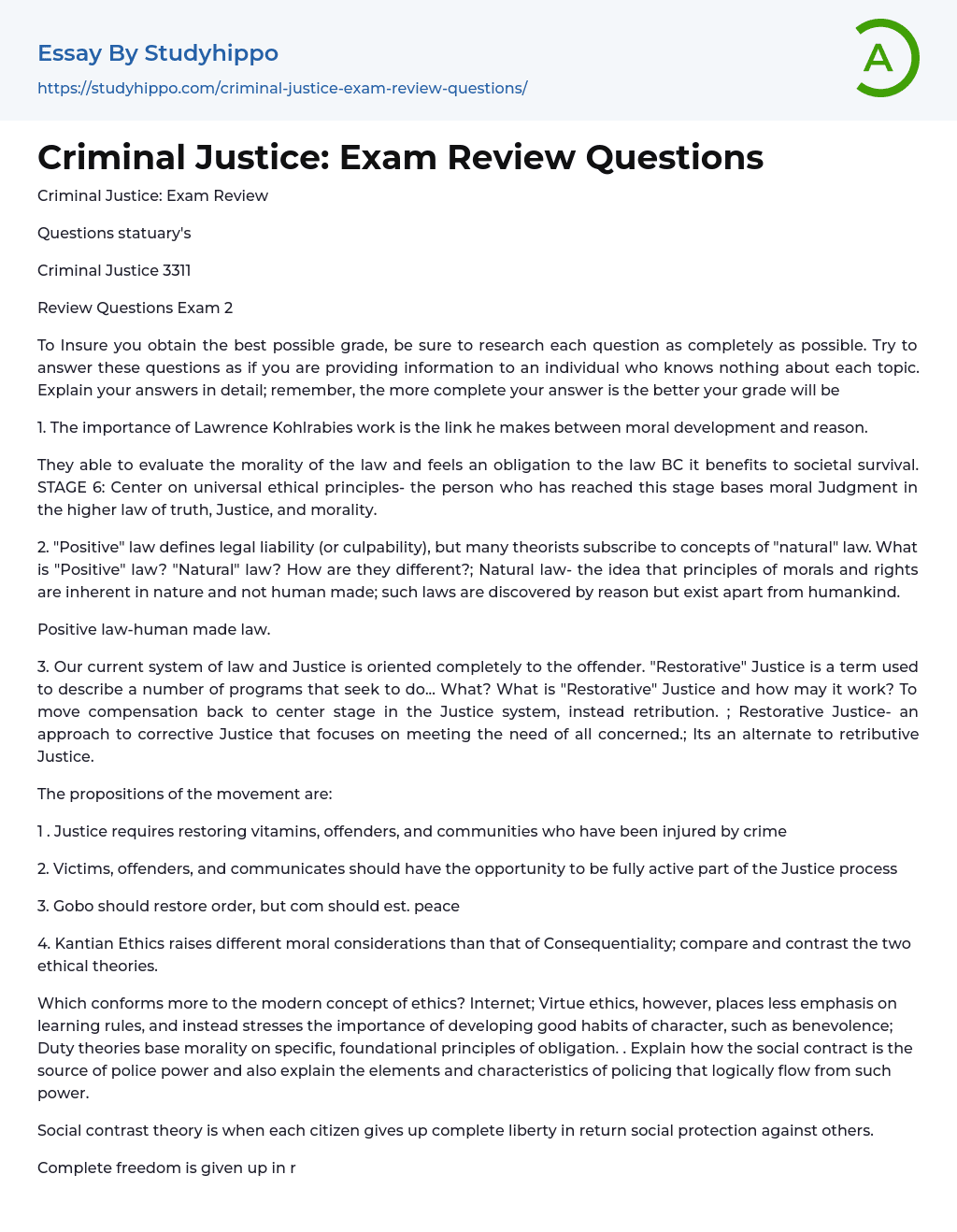Criminal Justice: Exam Review
Questions statuary's
Criminal Justice 3311
Review Questions Exam 2
To guarantee the best grade, it is important to conduct comprehensive research for each question.
When discussing the importance of Lawrence Kohlberg's work, it is crucial to emphasize the connection he establishes between moral development and reason. Kohlberg's research enables individuals to assess the morality of laws and acknowledges their obligation to follow these laws due to their benefits to societal survival.
In Kohlberg's stages of moral development, Stage 6 focuses on centering ethical principles that are universal. People at this stage base their moral judgments on the higher law of truth, justice, and morality.
The concept of "Positive" law is related to legal liab
...ility or culpability, while different theorists support the notion of "Natural" law. However, what do these terms signify and how do they vary? Essentially, "Natural" law indicates principles of morals and rights that are innate in nature and not man-made. These laws are uncovered through reasoning and exist autonomously from humanity. Conversely, positive law refers to laws that are formulated by humans.
3. The current legal system focuses solely on the offender, but "Restorative" Justice aims to shift this emphasis. It refers to various programs that prioritize compensation over retribution. So, what is "Restorative" Justice and how does it function?
Restorative Justice is an approach to corrective Justice that prioritizes meeting the needs of everyone involved. It serves as an alternative to retributive Justice. The movement's key propositions are: 1. Justice necessitates restoring victims, offenders, and communities affected by crime; 2. The
Justice process should actively involve victims, offenders, and communities; 3. The opportunity for full participation in the Justice process should be granted to victims, offenders, and communities.
Gobo should restore order, but com should establish peace. Kantian Ethics and Consequentiality have different moral considerations; compare and contrast the two ethical theories. Which theory conforms more to the modern concept of ethics? Internet; Virtue ethics, on the other hand, places less emphasis on learning rules and instead highlights the significance of developing good character habits, like benevolence. Duty theories ground morality on specific foundational principles of obligation. Explain how the social contract serves as the source of police power and discuss the elements and characteristics of policing that are logically derived from this power.
Based on the theory of social contrast, individuals sacrifice their absolute freedom to receive protection from others in society. We rely on the police force to maintain our safety, even though we recognize that this authority could potentially be employed against us. This theory rests upon three principles: 1.
Ensuring a sense of safety is crucial, and if it is lacking, rebuilding the social contract becomes imperative. The police should employ only the least amount of force necessary to safeguard others, with any additional use allowing the public to voice their dissent. Ethics are shaped by objectives, resulting in five ethical principles that stem from the social contract, such as fair access and more.
The police culture has values and an informal code of behavior which differ from the formal principles advocated by police management. These include public trust, teamwork, and objectivity.
The ethical arguments for and against law enforcement officers accepting gratuities are as follows: Against
- Police officers are supposed to be proof and not accept gratuities. Accepting gratuities can make officers susceptible to corruption. People may expect differential treatment when they give gratuities. Accepting gratuities can be seen as an abuse of authority. Gratuities can make up as much as 30% of an officer's income and can potentially lead to more serious corruption. It can create the perception that police officers are corrupt. For - Some argue that there is nothing wrong with frequent users of police services paying extra. Educators tend to downplay the seriousness of accepting gratuities. Additionally, there are three types of explanations for police misconduct, including the societal explanation.
Commute policing raises concerns about corruption among building officials, as they develop close relationships with the community, making it difficult to easily identify illegal activities.
- Animal Cruelty essays
- Law Enforcement essays
- Juvenile Justice System essays
- Surveillance essays
- Forensic Science essays
- Crime Prevention essays
- Criminal Justice essays
- Criminology essays
- Drug Trafficking essays
- Juvenile Delinquency essays
- Organized Crime essays
- Penology essays
- Prison essays
- Property Crime essays
- Punishment essays
- Serial Killer essays
- Sexual Offence essays
- Victim essays
- Crime scene essays
- Punishments essays
- Charles Manson essays
- Juvenile Crime essays
- Piracy essays
- Stealing essays
- Gang essays
- Hate Crime essays
- Homicide essays
- Damages essays
- Murder essays
- Robbery essays
- Ted Bundy essays
- Prostitution essays
- Violent crime essays
- Rape essays
- Identity Theft essays
- Sexual Harassment essays
- Distracted Driving essays
- Drunk Driving essays
- Detention essays
- Sexual Assault essays
- Sexual Assault on College Campuses essays
- Cyber Crime essays
- White Collar Crime essays
- Fur essays
- Federal Bureau Of Investigation essays
- Fire Department essays
- Criminal Justice System essays
- Commitment essays
- Mass Incarceration essays
- Kill essays




